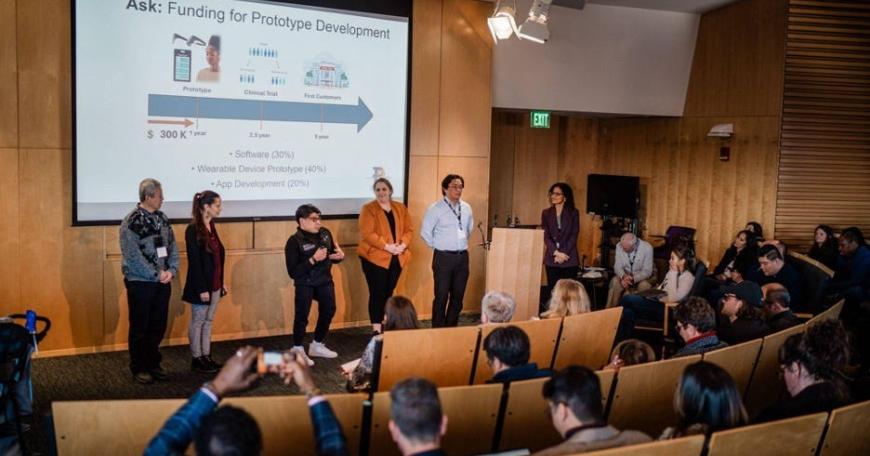
Fueling entrepreneurial solutions for substance use disorder
By Mariah Rawding
More than 80 innovators from around the world recently gathered at MIT to take part in the immersive Substance Use Disorder (SUD) Ventures program, which aims to spark the creation of innovative biomedical ventures in the substance use disorder space.
Affecting one in six adults in the United States, substance use disorder is both common and deadly. In 2022, MIT Open Learning received a grant from the National Institute on Drug Abuse (NIDA) to build a program and curriculum to enhance the innovation and entrepreneurship training for researchers, specifically in substance use disorders, “to meet the nation’s biomedical, behavioral and clinical research needs.” To address this call to action, the SUD Ventures program was built by a team at Open Learning, focusing on a hands-on approach with a multidisciplinary cohort in order to push the boundaries of innovation.
“While we are beginning to see a decline in annual overdose deaths, this crisis still claims the lives of nearly 90,000 people each year. Many of our learners have lived experience, reminding us that each life lost is someone’s beloved child, parent, family member, or friend,” says Hanna Adeyema, director of MIT Bootcamps and the SUD Ventures program. “Meanwhile, the drug supply continues to evolve; yet there are few FDA-approved treatments for substance use disorders — and even these remain inaccessible to many patients. Stigma and socio-economic barriers further prevent many from receiving the care they need.”
Meeting the moment at MIT

The substance use disorder ecosystem is extremely complex, with many potential avenues for innovation. Over the course of the three-month blended program, the curriculum focused on bringing salient topic areas to the front of the discussion for learners.
“Innovations across all areas of substance use disorder prevention, diagnosis, treatment, and recovery are urgently needed.” says Adeyema. “That’s the mission of the SUD Ventures Program: to unleash new solutions by bringing together not only a wide range of experts but also a diversity of solutions.”
During the online portion of the program this fall, learners were grouped into multidisciplinary teams of five to six and asked to work on one of three key topic areas: substance use disorder treatment and incarceration, drug delivery and success, or substance use disorder in vulnerable populations. MIT brought in a number of experts from around the U.S. to shed light on the important intersections of substance use disorder with the criminal system, intellectual property law, and entrepreneurial finance, while also focusing on the foundations of team building, ideation, and innovation.
Once participants arrived at MIT, the program shifted into a higher gear, designed to maximize hands-on learning, emphasizing collaboration, coaching, and problem solving. Highlights included sessions on entrepreneurial leadership, led by Bill Aulet, managing director of the MIT Martin Trust Center for Entrepreneurship, and go-to-market strategies for regulated products, delivered by MIT-trained entrepreneurs Chris Pirie and Vanessa Gurie. Later in the week, Deborah Mash, CEO of DemeRx, shared insights into managing withdrawals through neuroplastogen medications, while Satya Prateek Bommaraju, chief data scientist at Marigold Health, discussed AI’s intersection with substance use.
Guest speakers brought real-world expertise to the classroom from a panel of investors from Kodori, Ambria Capital, 10xBeta, and Flare Capital, who shared their investment criteria to many experts in the space including John Konsin of Prapela, Erdin Beshimov of ClassHour, Tom Knight of Invistics, Kelly Clark of Addiction Crisis Solutions, Nat Sims of Massachusetts General Hospital, Tim Mackey of S-3 Research, and Liz Ryan and the team from Boulder Care.
Speaking about the intensity of the program, Razi Masood, learner, technical founder and CEO of ClarityTek, says, “Now we are here in-person and it’s totally different. There’s a lot of energy even though we are here 16 hours a day. It’s been intense, but worthwhile.”
Energized to innovate for impact

With 15 innovative ventures tackling one of the most pressing challenges in society today, the program pushed the boundaries of innovation. Each team built a venture focused on their topic area and pitched it to a panel of investors, topic experts, and NIDA program staff on the final day of the program.
The finalists pitched ventures ranging from non-invasive technologies, like a device to monitor opioid levels and a patch to replace daily pills, to platforms that highlighted the need for connection and support in times of challenging transition for individuals facing substance use disorders. The winning ventures pitched an online marketplace providing vetted housing solutions to support individuals on their recovery process, while the runner-up shared a technology solution to ensure continuity of care for individuals leaving the carceral system.
Brandi Fink, an associate professor at Oklahoma State University Health Sciences, reflected on how the program experience impacted her.
“The program has been totally exhausting, totally energizing, and totally inspiring. I have made great relationships that I know will be enduring — personally and professionally,” says Fink. “I’m energized to search for novel solutions, not only commercially, but in my clinical research and practice, too.”
Learn more about the next SUD Ventures program. Sign up for the waitlist today.
The program and its research are supported by the National Institute on Drug Abuse of the National Institutes of Health under Award Number UE5DA056914. This award is subject to the Cooperative Agreement Terms and Conditions of Award as set forth in RFA DA-22–020, entitled “Growing Great Ideas: Research Education Course in Product Development and Entrepreneurship for Life Science Researchers (UE5 Clinical Trial Not Allowed).”
The content of this publication is solely the responsibility of the authors and does not necessarily represent the official views of the National Institutes of Health.
Fueling entrepreneurial solutions for substance use disorder was originally published in MIT Open Learning on Medium, where people are continuing the conversation by highlighting and responding to this story.

